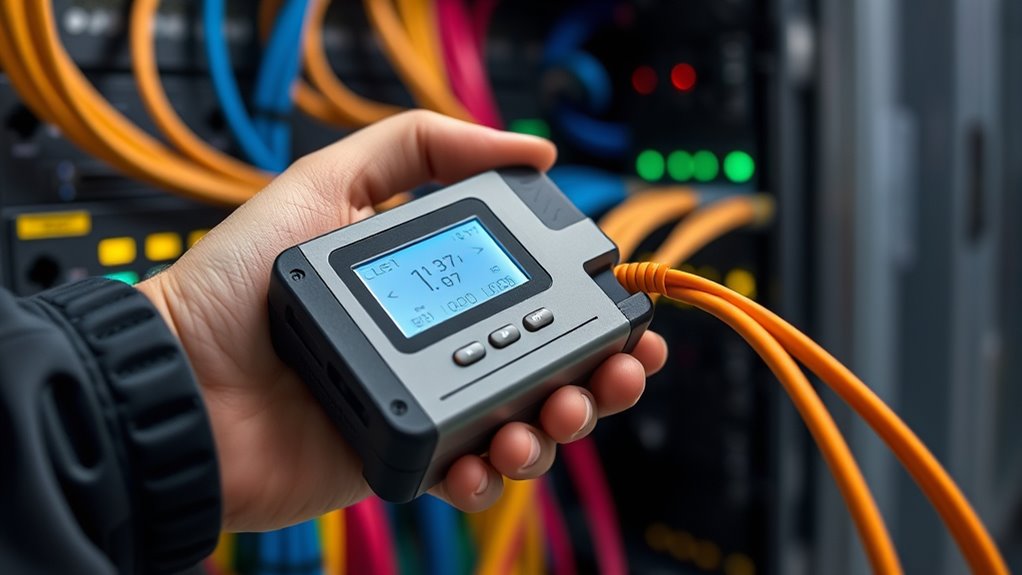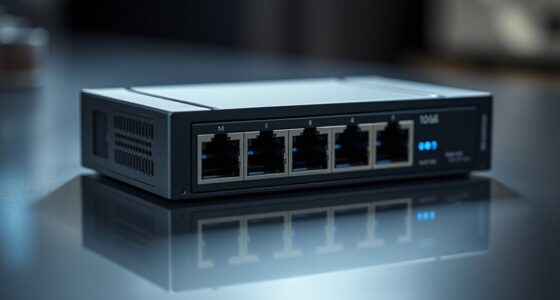If you’re looking for the best cable certifiers for Cat6 in 2025, I recommend considering versatile tools like the NOYAFA NF-8209 and Fluke Networks MicroScanner2, which support thorough testing, fault detection, and certification standards. Durable outdoor cables like Cable Matters and Celertec are ideal for harsh environments. Whether you’re a professional or DIY enthusiast, the right tester depends on your needs and budget. Keep exploring, and you’ll find the perfect fit for your network projects.
Key Takeaways
- Choose certifiers supporting Cat6 standards with certifications from UL, ETL, or CE for reliable testing.
- Prioritize devices with comprehensive features like wire mapping, length measurement, and PoE testing.
- Opt for portable, user-friendly testers with one-button operation and clear display for field use.
- Consider compatibility with standards such as ANSI/TIA-568-C.2 and ISO/IEC 11801 for future-proofing.
- Evaluate data reporting capabilities for easy documentation via PDFs, CSVs, or real-time sharing options.
Network Cable Tester for RJ45, Cat5, Cat6, 5e, 6e

If you’re looking for an affordable yet reliable cable tester for basic network troubleshooting, the NOYAFA NF-8108M stands out. It tests RJ45, Cat5, Cat6, 5e, and 6e cables, offering continuity checks, length measurement, wiring error detection, and fault location with remote jacks. Powered by AA batteries, it’s compact and easy to use, with a simple interface and multiple remotes for testing multiple cables simultaneously. While it’s not highly precise—length readings can be off—it quickly identifies faults, making it perfect for quick diagnostics. Its affordability makes it a solid choice for non-critical tasks, especially when handled with care.
Best For: DIY enthusiasts and technicians seeking an affordable, easy-to-use cable tester for quick network troubleshooting without the need for highly precise measurements.
Pros:
- Affordable price point makes it accessible for basic testing needs
- Compact and lightweight design for easy handling and portability
- Supports testing multiple cables simultaneously with remote jacks
Cons:
- Length measurement can be significantly inaccurate, sometimes up to 75% off
- Build quality feels cheap, with plastic construction and sharp edges
- No voltage protection; risk of damage when testing POE cables
NOYAFA NF-8209 Network Cable Tester

The NOYAFA NF-8209 Network Cable Tester stands out for its extensive multi-function testing capabilities, making it an ideal choice for both professional cabling technicians and serious DIY enthusiasts. It combines CONT, length testing, scanning, POE, FLASH, QC, and NCV functions, supporting CAT5, CAT6/6a cables, and standards like PSE and at/af. Its high-precision length measurement (1.5–200 meters) quickly identifies faults like open or short circuits. It also tests PoE devices, detects voltage, and locates ports using flashing lights. Its user-friendly features, including LED lighting and responsive support, make cable testing efficient, reliable, and versatile for various applications.
Best For: Professionals and DIY enthusiasts seeking a versatile, high-precision cable tester for network setup, troubleshooting, and maintenance.
Pros:
- Multi-function testing capabilities including CONT, length, POE, FLASH, QC, and NCV functions
- Supports a wide range of cables and standards such as CAT5, CAT6/6a, PSE, and at/af standards
- High-precision length measurement (1.5–200 meters) with quick fault detection and port location features
Cons:
- May require some familiarity with network testing procedures for optimal use
- Limited to testing up to 200 meters in length, which might be insufficient for very large installations
- The device’s complexity could be overwhelming for users seeking only basic cable testing
Fluke Networks MicroScanner2 Copper Cable Verifier

Designed for technicians who need quick, reliable cable testing on active networks, the Fluke Networks MicroScanner2 Copper Cable Verifier offers all-encompassing functionality without requiring adapters. It tests voice, data, and video cables through integrated RJ11, RJ45, and coax ports, supporting low voltage testing for efficient installations and troubleshooting. Capable of identifying Ethernet speeds, PoE, and POTS, it also measures cable length up to 460 meters and detects faults with TDR technology. Its bright, backlit LCD displays multiple test results simultaneously, making interpretation straightforward. Ruggedly built with accessories like a detachable wire map adapter and a carry pouch, it’s a versatile tool for any network technician.
Best For: network technicians and installers who need quick, reliable, and versatile cable testing on active networks without carrying multiple adapters.
Pros:
- Supports testing of voice, data, video cables via integrated ports without needing external adapters
- Capable of detecting Ethernet speeds, PoE, and POTS, aiding comprehensive troubleshooting
- Rugged design with accessories like a detachable wire map adapter and bright, easy-to-read display
Cons:
- Limited to copper cable testing; does not test fiber optic cables
- Requires batteries, which may need replacement over time
- Advanced features like remote device identification may require additional training for optimal use
Cable Matters Cat6 Ethernet Cable (500ft, Blue)

For professionals seeking reliable and high-performance cabling, the Cable Matters Cat6 Ethernet Cable (500ft, Blue) stands out with its support for 10-Gigabit Ethernet and high bandwidth capacity up to 550 MHz. Made with 23 AWG bare copper conductors, it guarantees fast, stable data transfer and enhanced durability. Its riser-rated (CMR) jacket provides fire resistance, making it suitable for multi-story installations. The cable’s 500-foot spool and easy-pull reel simplify large-scale deployments, while compatibility with Gigabit and Fast Ethernet offers versatile connectivity options. Overall, this cable combines safety, performance, and ease of installation for demanding networking environments.
Best For: professionals and large-scale network installers seeking reliable, high-speed, and durable Ethernet cabling for commercial or residential multi-story environments.
Pros:
- Supports 10-Gigabit Ethernet with high bandwidth up to 550 MHz for demanding applications
- Made with 23 AWG bare copper conductors for enhanced performance and durability
- Riser-rated (CMR) jacket offers fire resistance for safe multi-floor installation
Cons:
- Longer spool may be cumbersome to handle without proper storage solutions
- Bulk packaging may require additional connectors or outlets for complete setup
- Not ideal for outdoor use unless specifically rated for exterior environments
CAT6 Outdoor Ethernet Cable, 500ft, UV Resistant, Weatherproof, CMX, ETL Listed

If you’re installing outdoor Ethernet networks, the Celertec CAT6 Outdoor Cable stands out thanks to its UV-resistant and weatherproof design, making it ideal for harsh environments. Its LLDPE jacket withstands UV rays, rain, and temperature fluctuations, outperforming PVC in tough conditions. With 500 feet of solid bare copper conductors, it supports high-speed data transmission up to 550 MHz, suitable for 1Gb and 10Gb speeds over shorter distances. Packaged on a sturdy wooden spool, it features sequential foot markings for easy installation. Certified ETL and compliant with industry standards, this cable ensures reliable, durable outdoor networking performance.
Best For: outdoor network installers and professionals seeking durable, high-speed Ethernet connections in harsh environmental conditions.
Pros:
- UV resistant and weatherproof, suitable for outdoor use
- Supports high-speed data transmission up to 550 MHz for reliable performance
- Packaged on a sturdy wooden spool with sequential foot markings for easy installation
Cons:
- 500ft length may be excessive for small-scale or indoor setups
- Solid copper conductors can be less flexible and harder to bend during installation
- Bulk spool may require careful handling to prevent tangling or damage
NOYAFA Network Cable Tester for RJ45, RJ11, RJ12 /Cat5, Cat5e, Cat6, Cat6a, Cat7, Phone Line Cat3, Ethernet Tester, LAN Cable Test Tool

The NOYAFA NF-468CS stands out as an all-in-one network cable tester, making it an ideal choice for technicians and DIY enthusiasts who need to quickly diagnose and troubleshoot a wide range of cabling issues. It supports various cable types, including RJ45, RJ11, RJ12, and multiple Cat standards from Cat3 to Cat7, making it versatile for different setups. The device detects faults like shorts, open circuits, and cross-pair issues, with a maximum testing range of 1000 meters. Its one-button operation delivers instant results, and it also tests PoE supply up to 60V. Compact and portable, it’s perfect for field use and network maintenance.
Best For: technicians, network installers, and DIY enthusiasts who need a reliable all-in-one tool for diagnosing and troubleshooting various cabling issues across different network types.
Pros:
- Supports a wide range of cable types including RJ45, RJ11, RJ12, and multiple Cat standards from Cat3 to Cat7.
- Detects faults such as shorts, open circuits, cross-pair issues, and tests PoE supply up to 60V.
- Compact, portable, and easy to operate with one-button testing and remote viewing capabilities.
Cons:
- Limited to testing up to 1000 meters, which may not be sufficient for very long cable runs.
- The device’s feature set might be overwhelming for casual users who only need basic connectivity checks.
- Battery life and charging time are not specified, which could impact field usability over extended periods.
Network Ethernet Cable Tester for LAN RJ45 Cat5e Cat6 RJ11 RJ12
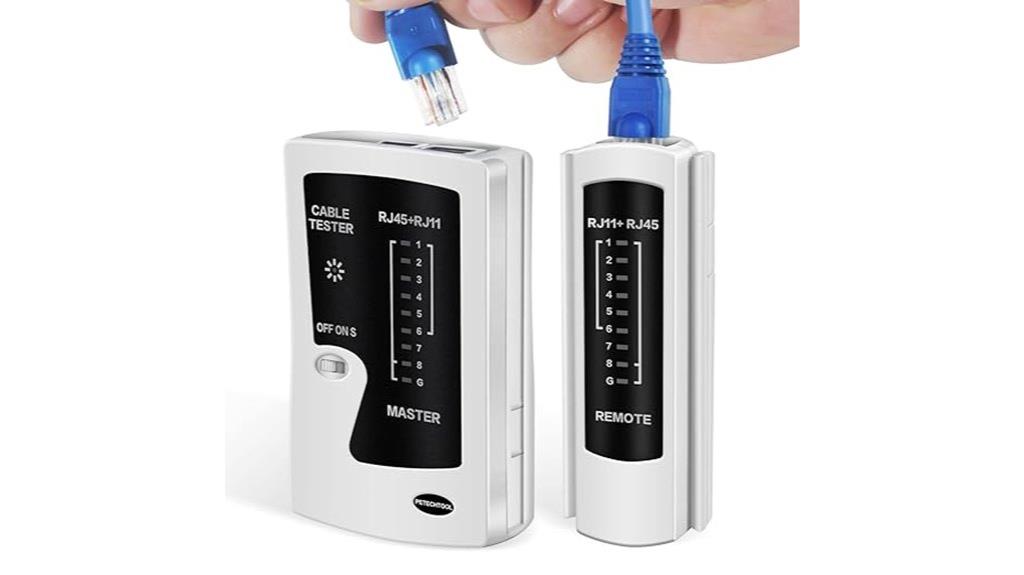
This network Ethernet cable tester stands out for its versatility, making it an ideal choice for professionals and DIY enthusiasts who need to verify both LAN and telephone cables quickly. It supports RJ45, RJ11, and RJ12 connectors, covering Cat5e, Cat6, and even shielded cables up to 250 feet. The built-in high-performance chip guarantees fast, accurate testing of wire continuity, pairing, and wiring issues. Its LED indicators clearly display results, while the lightweight design and durable housing make it perfect for field use. Whether troubleshooting in-wall wiring or checking jumper cables, this tester offers reliable, straightforward performance at an affordable price, making it a valuable tool in any network setup.
Best For: DIY enthusiasts and professionals who need a reliable, versatile cable tester for LAN and telephone wiring in small to medium network setups.
Pros:
- Supports multiple cable types including RJ45, RJ11, and RJ12 for comprehensive testing needs.
- Clear LED indicators provide easy-to-understand results, ideal for quick troubleshooting.
- Lightweight and durable design makes it portable and suitable for field use.
Cons:
- Fiddly connectors and retaining clips can be difficult to handle during testing.
- Requires a 9-volt battery (not included), adding an extra step for setup.
- Limited advanced features may not suit complex network troubleshooting requirements.
Triplett LAN Cable Tester (TVR10/100/1000 Byte Brothers)
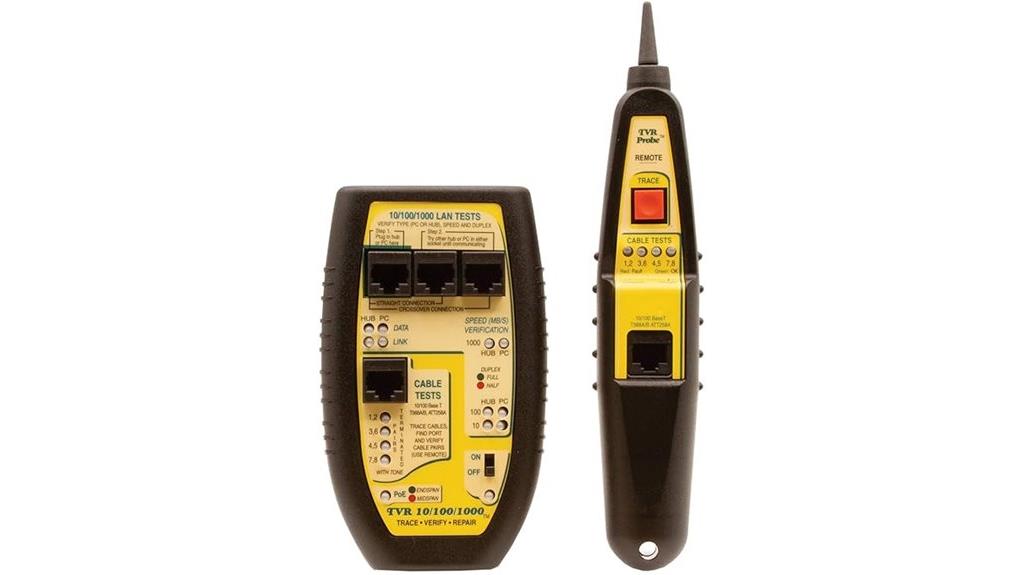
Designed for network professionals and serious hobbyists alike, the Triplett LAN Cable Tester (TVR10/100/1000 Byte Brothers) stands out with its ability to verify device type, test cable wiring, and support multiple testing modes. It works with hubs, switches, PCs, and cables, providing four testing modes: speed and PoE, negotiated speed and PoE, cable testing, and tracing. It also functions as an inline network activity monitor, displaying negotiated speed and duplex. The device indicates whether straight-through or crossover cables are needed, simplifying setup. Included accessories like RJ45 cables, an adapter, and batteries make it portable and ready for reliable LAN troubleshooting and setup.
Best For: network professionals and serious hobbyists seeking reliable LAN testing, cable verification, and network diagnostics.
Pros:
- Supports multiple testing modes including speed, PoE, and cable tracing for comprehensive diagnostics.
- Compatible with hubs, switches, PCs, and various cables, ensuring versatile use.
- Includes accessories like RJ45 cables, an adapter, and batteries, enhancing portability and convenience.
Cons:
- May require familiarity with network terminology for optimal use.
- Limited to LAN testing; not suitable for wireless network diagnostics.
- The device’s size and setup might be less convenient for very tight or portable environments.
LIUJINCAN Untwist Tool for Network Cables (CAT5/CAT6/CAT7)

If you’re tackling large LAN projects or working in tight spaces, the LIUJINCAN Untwist Tool for Network Cables offers a reliable and efficient solution. Designed for quick preparation of twisted pairs, it easily untwists CAT5, CAT6, and CAT7 cables before crimping, saving you time and reducing hand fatigue. Its durable brass construction and ergonomic grip make it suitable for high-volume jobs, while the compact design ensures portability. Customers praise its effectiveness and durability, noting it simplifies wire straightening and minimizes effort. Although some plastic sleeves may slip after extensive use, overall, this tool enhances productivity for professional installers and DIY enthusiasts alike.
Best For: professional network installers, IT specialists, and DIY enthusiasts working on large LAN projects or in tight spaces who need a reliable and efficient tool for untwisting and preparing Ethernet cables quickly.
Pros:
- Durable and corrosion-resistant solid brass construction ensures long-lasting use.
- Ergonomic, slip-resistant handle reduces hand fatigue during repetitive tasks.
- Significantly speeds up cable preparation, saving time and improving productivity.
Cons:
- Plastic sleeves may slip after extensive use, affecting performance.
- Some users report occasional fit issues with certain CAT6 cables.
- Compact size requires careful handling to avoid misplacement or loss.
Rsrteng Network Cable Tester Kit (NO.1 to NO.10)

The Rsrteng Network Cable Tester Kit (NO.1 to NO.10) stands out as an excellent choice for network technicians and security professionals who need to test multiple cables efficiently. It supports RJ45, Cat5, Cat6, and other Ethernet cables, with compatibility for various CCTV testers. The kit allows testing up to 10 cables simultaneously, making fault detection, length measurement, and continuity testing quick and straightforward. Its user-friendly design lets you connect cables, select modes, and view results on the screen, all in one operation. Perfect for streamlining large-scale testing tasks, this kit boosts productivity and ensures reliable network setups.
Best For: network technicians and security professionals who need to test multiple Ethernet and CCTV cables efficiently and accurately.
Pros:
- Supports testing of up to 10 cables simultaneously, saving time and increasing productivity.
- Compatible with a wide range of cables including RJ45, Cat5, Cat6, and various CCTV testers.
- User-friendly operation with easy connection, mode selection, and clear result display.
Cons:
- Limited to testing Ethernet and CCTV cables; may not be suitable for other types of wiring.
- Requires manual connection and mode selection, which might be challenging for beginners.
- Remote kits may need additional serial number options for certain configurations or larger testing setups.
GEARit Cat6 Outdoor Ethernet Cable (250ft)
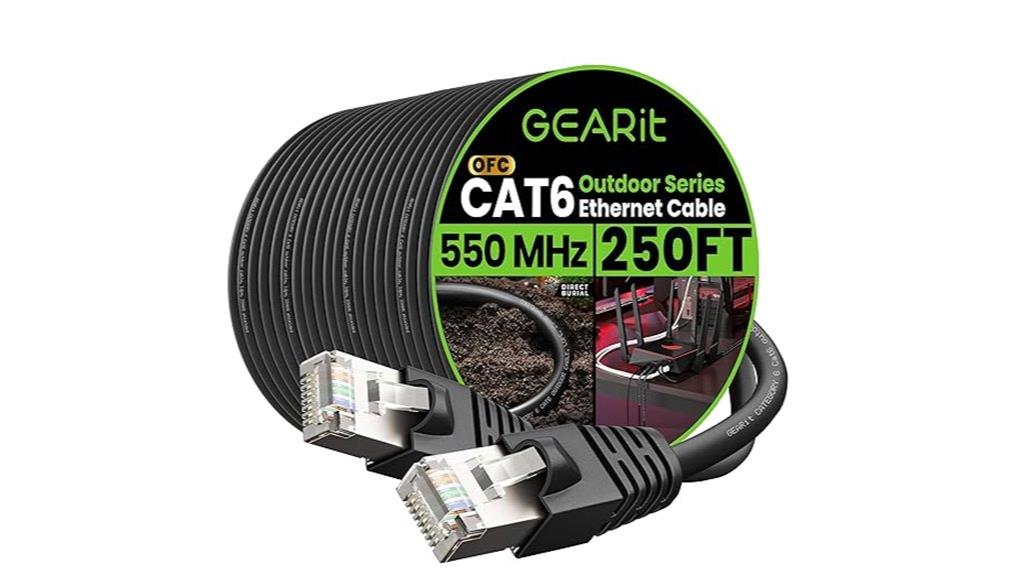
For outdoor setups that demand reliable, high-speed connections, the GEARit Cat6 Outdoor Ethernet Cable (250ft) stands out as an excellent choice. Its rugged design features a durable LLDPE jacket rated for direct burial, eliminating the need for conduits. The UV-resistant outer layer and waterproof construction guarantee long-term performance in harsh weather conditions. Supporting speeds up to 10 Gbps and 600 MHz bandwidth, it uses shielded foil twisted pairs of oxygen-free copper for consistent signals. Gold-plated RJ45 connectors with protective bubble boots make installation easier and more durable. This cable is ideal for outdoor LAN, POE, and internet connections, providing stability and reliability over extended distances.
Best For: outdoor homeowners, backyard office setups, and professional installers seeking reliable, high-speed outdoor Ethernet connectivity in harsh weather conditions.
Pros:
- Rugged, durable construction with UV-resistant and waterproof features for long-term outdoor use
- Supports high-speed data transfer up to 10 Gbps and 600 MHz bandwidth for seamless performance
- Easy installation with gold-plated connectors and protective bubble boots, suitable for direct burial
Cons:
- May be more expensive than standard indoor Ethernet cables due to outdoor-grade features
- Heavier and less flexible than indoor cables, potentially complicating installation in tight spaces
- Limited to outdoor use; not suitable for indoor networking without appropriate connectors or adaptation
Fluke Networks MicroScanner Copper Cable Verifier and PoE Tester
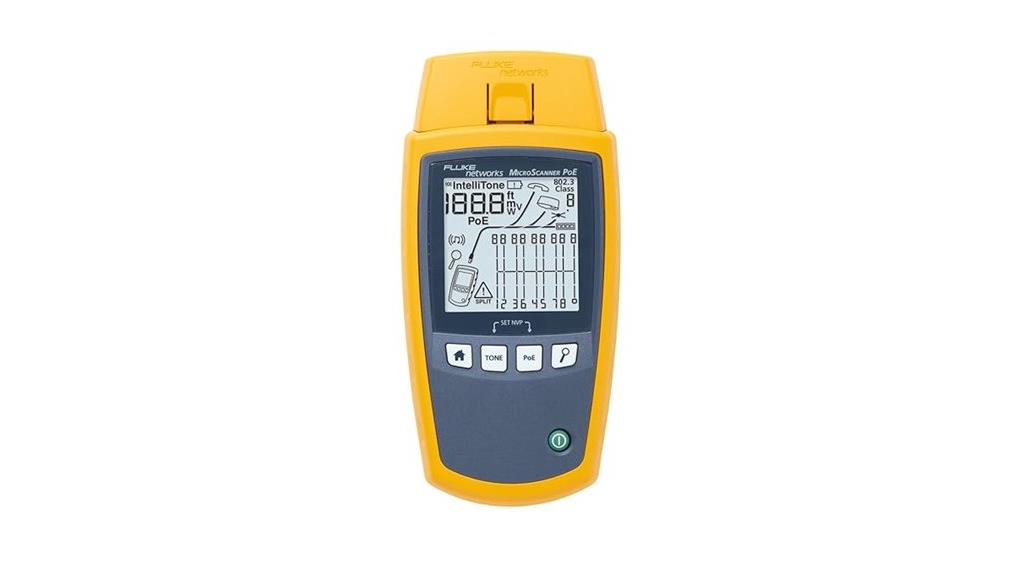
Designed for network professionals who need reliable PoE verification and cable diagnostics, the Fluke Networks MicroScanner Copper Cable Verifier and PoE Tester streamlines installation and troubleshooting. It quickly verifies Ethernet-powered devices like VoIP phones, cameras, and access points, ensuring ideal setup. With support for Class 0-8 PoE standards, it detects power sources, measures voltage up to 90W, and displays the maximum power class. The device also tests network speeds up to 10G, measures cable length, performs wire map testing, and locates faults. Its rugged design, large backlit LCD, and intuitive icons make diagnostics straightforward, saving time and reducing errors during installation and maintenance.
Best For: network professionals seeking a reliable tool for PoE verification and cable diagnostics to ensure efficient installation and troubleshooting.
Pros:
- Supports a wide range of PoE standards (Class 0-8, 802.3at, af, bt, Cisco UPOE, PoH) for versatile power testing
- Large, backlit LCD with intuitive icons for easy diagnostics in various lighting conditions
- Combines cable testing, wire mapping, fault location, and PoE verification in a rugged, ergonomic design
Cons:
- Probe for IntelliTone toning sold separately, requiring additional purchase for cable locating
- Limited to testing cable lengths up to 460 meters (or 1500 feet with resolution limitations)
- May be more expensive compared to basic cable testers, potentially exceeding budgets for simple needs
Factors to Consider When Choosing a Cable Certifier for Cat6
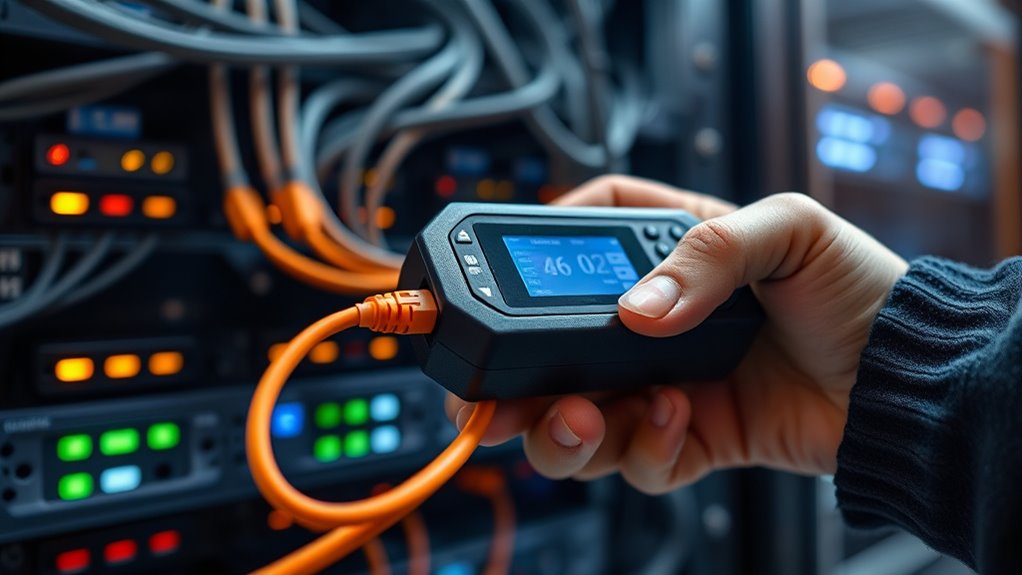
When selecting a cable certifier for Cat6, I consider certification standards to guarantee compliance with industry requirements. I also look at testing capabilities, port compatibility, and durability to match field conditions. Finally, ease of use is vital for efficient testing and accurate results.
Certification Standards Compliance
Ensuring your cable certifier meets industry standards is crucial for accurate and reliable testing of Cat6 cables. I always verify that the device complies with key standards like ANSI/TIA-568-C.2 and ISO/IEC 11801, which confirm it can properly certify cable performance. I also look for certifications from recognized bodies such as ETL, UL, or CE, guaranteeing the device meets safety and quality benchmarks. It’s important that the certifier supports testing for category-specific requirements, including Cat6 performance and bandwidth specifications up to 250 MHz or higher. Additionally, I check that the device can perform extensive tests like wire mapping, length measurement, and NEXT/crosstalk analysis, all in accordance with industry standards. Regular updates to meet evolving standards ensure my testing remains future-proof.
Testing Capabilities Needed
Choosing the right cable certifier for Cat6 networks means verifying that it has the advanced testing features needed to guarantee peak performance. First, it must verify compliance with standards like TIA/EIA-568-C.2. Essential functions include wire mapping, length measurement, and fault detection, such as opens, shorts, and cross-pair issues. Accurate length measurement within a few centimeters or inches helps identify installation errors. Additionally, testing for PoE compatibility and power delivery ensures the cable supports powered devices properly. Clear, easy-to-understand results—whether visual indicators or detailed reports—are vital for efficient troubleshooting. These testing capabilities ensure your network runs at its best and that issues are identified and resolved swiftly, saving you time and minimizing downtime.
Port Compatibility Features
Supporting the right connector types and testing configurations is vital, so it’s important to verify that your cable certifier is compatible with the specific ports used in your Cat6 installations. Make sure the device supports common connector types like RJ45, RJ11, or RJ12, depending on your setup. Compatibility with various cable standards, such as Cat6, Cat6a, or shielded/unshielded twisted pair cables, is also indispensable. You should check if the certifier can test all relevant connections, including straight-through, crossover, and punch-down configurations. It’s beneficial if it can test both end-to-end links and remote or patch panel ports. Finally, look for models with versatile port interfaces that can support other network cables or accessories, boosting your testing flexibility.
Durability for Field Use
When selecting a cable certifier for field use, durability becomes a top priority. You need a device with a rugged, impact-resistant housing that can handle tough environments, ideally with an IP rating suited for outdoor conditions. Weatherproof and waterproof features are essential to protect against rain, moisture, and extreme temperatures. Reinforced connectors and strain relief are critical, as they withstand frequent plugging, unplugging, and rough handling. I also look for models made from durable materials like reinforced plastic or metal, which resist cracking and wear over time. A secure, sealed design is important to keep dust, dirt, and environmental contaminants out of the internal electronics. Overall, durability ensures your certifier remains reliable and accurate even in demanding field conditions.
Ease of Operation
Ease of operation is essential because a user-friendly cable certifier allows for quick and accurate testing in the field. A simple interface with clearly labeled buttons and an intuitive menu system makes navigation straightforward, saving time during busy jobs. Devices with large, backlit displays help me read test results easily in various lighting conditions, reducing errors. One-button testing functions streamline the process, letting me perform tests efficiently without multiple steps, even if I’m not highly trained. Automated features that detect wiring faults, length, and certification status minimize manual interpretation and user error. Additionally, an ergonomic, lightweight design enhances portability and handling during extended periods of field testing. Overall, ease of operation ensures faster, more reliable results with less frustration.
Data Reporting Options
Choosing a cable certifier with robust data reporting options is essential because it directly affects how efficiently I can document, share, and analyze test results. Reliable reporting features ensure that I can generate detailed, formatted reports like PDFs, CSVs, or XML files for compliance and future reference. Real-time digital reports via USB, Ethernet, or Wi-Fi make it easy to access data instantly and integrate it into network management systems. Automated report generation minimizes manual errors and speeds up certification and audits. Advanced options, such as graphical data visualization and trend analysis, help me interpret results more effectively. Remote sharing capabilities also streamline collaboration with team members or clients, saving time and improving accuracy throughout the testing process.
Budget and Cost
The cost of cable certifiers for Cat6 can vary widely, from budget-friendly models under $100 to professional-grade tools exceeding $1,000. Lower-priced certifiers usually handle basic functions like continuity, wire mapping, and length testing, but they often lack detailed analysis or certification approval. These models are suitable for small projects or DIY enthusiasts. On the other hand, higher-cost certifiers offer advanced features such as all-encompassing testing reports, certification documentation, and troubleshooting tools, making them ideal for professional environments requiring certification compliance. When choosing a certifier, it’s essential to compare the features offered against the cost, ensuring you get the right balance for your project’s complexity and budget. Investing in a more expensive model can be cost-effective for large or certified installations.
Frequently Asked Questions
How Do Cable Certifiers Identify Faulty Wiring or Miswiring Issues?
Cable certifiers detect faulty wiring or miswiring by sending test signals through the cables and analyzing the results. I watch for inconsistencies like open circuits, shorts, or incorrect pinouts, which show up as errors or failures on the device. This process helps me quickly identify issues, ensuring the wiring is correct and meets standards before I move forward with installation or troubleshooting.
Can Cable Testers Verify Poe Power Delivery Levels Accurately?
Did you know that improper PoE power delivery can cause device failures and safety hazards? I can confirm that cable testers can verify PoE levels accurately if they’re equipped with the right features. They measure voltage, current, and power at the port, giving you a clear picture of whether your setup meets device requirements. Just make sure your tester supports PoE testing to avoid surprises down the line.
What Is the Typical Lifespan of a Professional Cable Certifier Device?
A professional cable certifier typically lasts around 5 to 10 years with proper care. I’ve found that regular calibration and avoiding rough handling extend its lifespan. It’s important to keep the device clean and stored in a safe, dry place. Upgrading firmware when available also helps uphold accuracy. Overall, investing in quality and maintenance ensures your certifier stays reliable for many years.
Are There Portable Cable Certifiers Suitable for On-Site Testing?
Yes, there are portable cable certifiers perfect for on-site testing. I’ve used models that are compact, lightweight, and easy to carry around, making field testing efficient. These devices often have quick setup times and rugged designs to withstand the job site environment. If you need reliable, mobile certification tools, I recommend looking for certified testers that balance portability with extensive testing features.
How Do Certifications From Different Brands Compare in Reliability?
Like comparing different brands is like tasting wines—each has its unique flavor, but reliability varies. I’ve found that well-known brands like Fluke and EXFO tend to be more consistent, with thorough testing and accurate results. Lesser-known options might save you money but can lack precision or durability. So, I recommend sticking to reputable brands for dependable certifications that guarantee your network’s performance and longevity.
Conclusion
When choosing a cable certifier for Cat6, consider reliability, compatibility, and ease of use. Prioritize tools that guarantee performance, durability, and accurate testing. Evaluate features that match your specific needs, from indoor to outdoor environments. Remember, the right certifier simplifies installation, assures network stability, and saves time. So, weigh your options carefully, choose confidently, and enjoy a seamless, high-quality network connection that meets your demands now and in the future.
